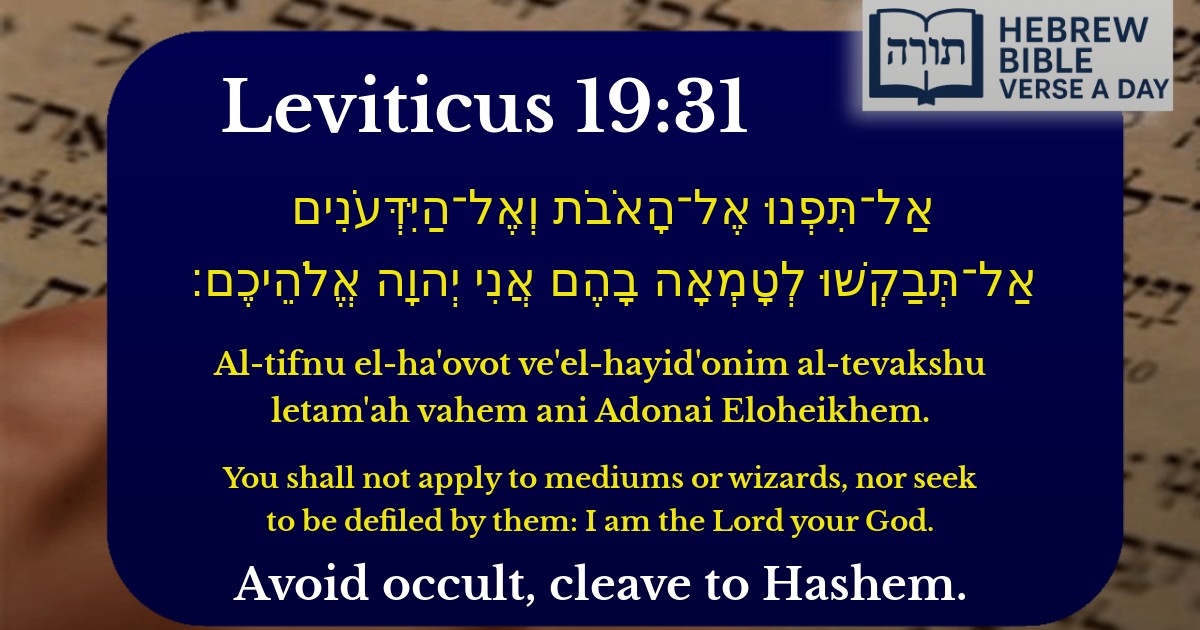Join Our Newsletter To Be Informed When New Videos Are Posted
Join the thousands of fellow Studends who rely on our videos to learn how to read the bible in Hebrew for free!
Hebrew Text
אַל־תִּפְנוּ אֶל־הָאֹבֹת וְאֶל־הַיִּדְּעֹנִים אַל־תְּבַקְשׁוּ לְטָמְאָה בָהֶם אֲנִי יְהוָה אֱלֹהֵיכֶם׃
English Translation
You shall not apply to mediums or wizards, nor seek to be defiled by them: I am the Lord your God.
Transliteration
Al-tifnu el-ha'ovot ve'el-hayid'onim al-tevakshu letam'ah vahem ani Adonai Eloheikhem.
Hebrew Leining Text
אַל־תִּפְנ֤וּ אֶל־הָאֹבֹת֙ וְאֶל־הַיִּדְּעֹנִ֔ים אַל־תְּבַקְשׁ֖וּ לְטׇמְאָ֣ה בָהֶ֑ם אֲנִ֖י יְהֹוָ֥ה אֱלֹהֵיכֶֽם׃
אַל־תִּפְנ֤וּ אֶל־הָאֹבֹת֙ וְאֶל־הַיִּדְּעֹנִ֔ים אַל־תְּבַקְשׁ֖וּ לְטׇמְאָ֣ה בָהֶ֑ם אֲנִ֖י יְהֹוָ֥ה אֱלֹהֵיכֶֽם׃
🎵 Listen to leining
Parasha Commentary
📚 Talmud Citations
This verse is quoted in the Talmud.
📖 Sanhedrin 65b
The verse is cited in a discussion about the prohibition of consulting with mediums and wizards, emphasizing the severity of these practices according to Torah law.
📖 Pesachim 111a
The verse is referenced in the context of discussing various forms of idolatry and forbidden practices, highlighting the command to avoid defilement through such means.


Prohibition Against Consulting Ovot and Yiddeonim
The verse (Vayikra 19:31) prohibits seeking out Ovot (mediums) and Yiddeonim (wizards), warning against defilement through such practices. Rashi explains that an Ov is a necromancer who conjures the dead, while a Yiddeoni is a soothsayer who speaks through a bone or object in their mouth (Rashi on Vayikra 19:31). The Rambam (Hilchot Avodat Kochavim 11:16) categorizes these practices as forms of idolatry, emphasizing their deceptive nature.
Spiritual Defilement and Divine Authority
The phrase "לְטָמְאָה בָהֶם" (to be defiled by them) underscores that engaging with occult practices brings ritual impurity. The Sifra (Kedoshim 6:7) teaches that such actions distance a person from kedushah (holiness) and contradict the foundational principle of "אֲנִי יְהוָה אֱלֹהֵיכֶם" (I am Hashem your God). This reaffirms that true guidance comes only from Hashem, not supernatural intermediaries.
Torah's Rationale for the Prohibition
Contemporary Application
While modern occult practices may differ in form, the principle remains: Jews are forbidden to consult psychics, astrologers, or any method claiming to reveal hidden knowledge outside Torah-sanctioned means (e.g., prophecy or ruach hakodesh). The Shulchan Aruch (Yoreh De'ah 179) extends this prohibition to all forms of divination, reinforcing reliance on tefillah and Torah wisdom instead.